VIPsight - October 2010
COMPANIES
Raid on price manipulators
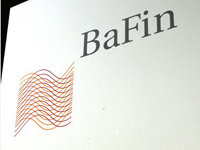 For two years now, extensive investigations by the police and the Federal Institution for Financial Services Oversight (BaFin) have been running against former deputy chair of investor association Schutzgemeinschaft der Kapitalanleger (SdK) Markus Straub, ex-SdK official Tobias Bosler and another 29 suspects. The accusations are price manipulation and insider trading, particularly in shares in the TECDAX company Wirecard, but also in “penny stocks” and possibly in the also TECDAX-listed Conergy. On 21 September police, public prosecutors and BaFin officials searched 48 offices and flats in Munich, Hamburg, Berlin and Kitzbühel, including the premises of the SdK, the Munich VEM Bank, Internet investor service Gonopa and financial publication “Der Aktionär”. Three suspects have been detained for investigation. Straub had already resigned from his post with the shareholder association in 2008, after he had been accused of manipulating the Wirecard share price downward in his position as shareholder lookout through his warnings, and himself speculating on falling prices. The accused, including journalists and writers of stock-exchange newsletters, allegedly drove the price downward using critical articles in the media and at annual general meetings, or upwards with recommendations, gaining millions in the process. At Wirecard the accusations even extend to money laundering, though the details are yet to be clarified. According to Der Spiegel, the investigators’ action is largely thanks to the “important preliminary work” by Wirecard’s lawyers, who do not wish the accusations to rest on them.
For two years now, extensive investigations by the police and the Federal Institution for Financial Services Oversight (BaFin) have been running against former deputy chair of investor association Schutzgemeinschaft der Kapitalanleger (SdK) Markus Straub, ex-SdK official Tobias Bosler and another 29 suspects. The accusations are price manipulation and insider trading, particularly in shares in the TECDAX company Wirecard, but also in “penny stocks” and possibly in the also TECDAX-listed Conergy. On 21 September police, public prosecutors and BaFin officials searched 48 offices and flats in Munich, Hamburg, Berlin and Kitzbühel, including the premises of the SdK, the Munich VEM Bank, Internet investor service Gonopa and financial publication “Der Aktionär”. Three suspects have been detained for investigation. Straub had already resigned from his post with the shareholder association in 2008, after he had been accused of manipulating the Wirecard share price downward in his position as shareholder lookout through his warnings, and himself speculating on falling prices. The accused, including journalists and writers of stock-exchange newsletters, allegedly drove the price downward using critical articles in the media and at annual general meetings, or upwards with recommendations, gaining millions in the process. At Wirecard the accusations even extend to money laundering, though the details are yet to be clarified. According to Der Spiegel, the investigators’ action is largely thanks to the “important preliminary work” by Wirecard’s lawyers, who do not wish the accusations to rest on them.
The SdK, whose Munich office was also searched, stated officially that the accusations have to do with long-known cases from between 2006 and 2008, and that the investigations were directed exclusively against the two ex SdK officials Straub and Bosler. According to the news magazine “Der Spiegel”, along with ex employee Christoph Öfele, SdK’s current chair Klaus Schneider is also among the accused. The association is one third financed through a share portfolio. However, the association holds the bulk of its securities, according to its own statements, in order to be able to challenge AGM decisions, said SdK spokesman Lars Labryga.
Commerzbank leaves payback open
 Commerzbank CEO Martin Blessing is still not saying when the second-largest German credit institution will be repaying the silent contribution by the government amounting to €16.4 billion. According to official interpretations, the bank is expected to begin the payback by 2012 at latest. Blessing has however clearly sketched out the procedure: first the silent contribution and then the government’s direct involvement of 25% plus one share are to be repaid. Doing away with the direct participation was not in the Commerzbank’s hands. According to the new Basel III capital rules, state aid will not be recognized as core capital until after 2017, so that there was no time pressure here. All the same, the bank was aiming at a rapid solution.
Commerzbank CEO Martin Blessing is still not saying when the second-largest German credit institution will be repaying the silent contribution by the government amounting to €16.4 billion. According to official interpretations, the bank is expected to begin the payback by 2012 at latest. Blessing has however clearly sketched out the procedure: first the silent contribution and then the government’s direct involvement of 25% plus one share are to be repaid. Doing away with the direct participation was not in the Commerzbank’s hands. According to the new Basel III capital rules, state aid will not be recognized as core capital until after 2017, so that there was no time pressure here. All the same, the bank was aiming at a rapid solution.
Conti to stay independent for some time
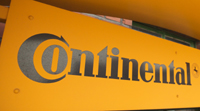 The operative business of automotive supplier Schaeffler and its holding in Hanover automotive supplier Continental have been put into a limited-liability company (GmbH). Additionally, employee representatives will for the first time be able to engage in co-determination on the Supervisory Board of the Bavarian group. It still remains open when the merger of Schaeffler with DAX-listed tiremaker Continental will come about. In an interview with Financial Times Deutschland, Schaeffler managing director Jürgen Geißinger said that at the moment there was no merger project between the two groups. A merger at the end of 2011 was, however, conceivable. “Both companies must first do their operational homework separately,” said Geißinger. After the capital increase at Continental in January, Schaeffler holds 42% of the Conti shares, while a further 33% are parked with banks.
The operative business of automotive supplier Schaeffler and its holding in Hanover automotive supplier Continental have been put into a limited-liability company (GmbH). Additionally, employee representatives will for the first time be able to engage in co-determination on the Supervisory Board of the Bavarian group. It still remains open when the merger of Schaeffler with DAX-listed tiremaker Continental will come about. In an interview with Financial Times Deutschland, Schaeffler managing director Jürgen Geißinger said that at the moment there was no merger project between the two groups. A merger at the end of 2011 was, however, conceivable. “Both companies must first do their operational homework separately,” said Geißinger. After the capital increase at Continental in January, Schaeffler holds 42% of the Conti shares, while a further 33% are parked with banks.
Deutsche Bank wants to fully consolidate Postbank
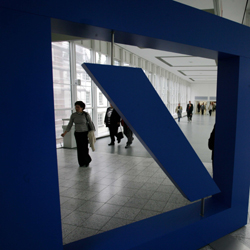 Currently, the Deutsche Bank holds 29.95% of the shares in Postbank. 40% are with Deutsche Post and a further 30% are on market as a free float. According to an agreement with Deutsche Post, the Frankfurt bank was to take over the remaining Post shares in 2013 at an average price of €35 per share. Josef Ackermann, CEO of Deutsche Bank, has now announced that his institution wants to fully consolidate Postbank by the year’s end, thus raising its share to over 50%. To achieve this, Ackermann offered Postbank shareholders in mid-September €25 per share with an option right in the ratio of two old shares to one new one – well below the price Deutsche Bank will have to pay Post for its remaining shares. To finance the public offering, the Deutsche Bank’s CEO has set going a parallel capital increase by 49.7% of the current registered capital. At a price of €33 per new share, the bank will thus take in by 6 October the record figure of 10.2 billion euros. The proceeds of the issue are also to go to strengthen the core capital. If it consolidates Postbank by the year’s end, Deutsche Bank will have to write down the Postbank shares by some €2.3 billion. To avert merger checks by US authorities, Deutsche Bank might sell part of the Postbank shares acquired to a third party, with a later buyback right.
Currently, the Deutsche Bank holds 29.95% of the shares in Postbank. 40% are with Deutsche Post and a further 30% are on market as a free float. According to an agreement with Deutsche Post, the Frankfurt bank was to take over the remaining Post shares in 2013 at an average price of €35 per share. Josef Ackermann, CEO of Deutsche Bank, has now announced that his institution wants to fully consolidate Postbank by the year’s end, thus raising its share to over 50%. To achieve this, Ackermann offered Postbank shareholders in mid-September €25 per share with an option right in the ratio of two old shares to one new one – well below the price Deutsche Bank will have to pay Post for its remaining shares. To finance the public offering, the Deutsche Bank’s CEO has set going a parallel capital increase by 49.7% of the current registered capital. At a price of €33 per new share, the bank will thus take in by 6 October the record figure of 10.2 billion euros. The proceeds of the issue are also to go to strengthen the core capital. If it consolidates Postbank by the year’s end, Deutsche Bank will have to write down the Postbank shares by some €2.3 billion. To avert merger checks by US authorities, Deutsche Bank might sell part of the Postbank shares acquired to a third party, with a later buyback right.
Hochtief faces hostile takeover
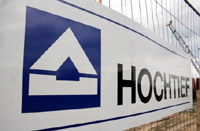 In mid-September, Spanish construction firm ACS unexpectedly announced a takeover bid to shareholders of German firm Hochtief. By the year’s end, ACS plans to raise its Hochtief holding to over 30%, and then build up further to over 50%. For five shares, the Spaniards are offering Hochtief shareholders eight ACS shares. Officially, the bid, which Hochtief regards as hostile, is to come in November. Only then could the Hochtief management officially take a position on it, said the Essen group’s CEO Herbert Lütkestratkötter. The group would defend itself against the takeover by every means, its CEO has already indicated. ACS currently holds 30% of the Hochtief securities and has two Supervisory Board posts. To protect the two ACS representatives against conflicts of interest, Hochtief has appointed an ad-hoc committee to discuss further proceedings, to which the ACS Supervisory Board members will not belong. Additionally, the Hochtief consulting team has taken on experts from Goldman Sachs. If there is a change of control at Hochtief, loans are likely to fall due.
In mid-September, Spanish construction firm ACS unexpectedly announced a takeover bid to shareholders of German firm Hochtief. By the year’s end, ACS plans to raise its Hochtief holding to over 30%, and then build up further to over 50%. For five shares, the Spaniards are offering Hochtief shareholders eight ACS shares. Officially, the bid, which Hochtief regards as hostile, is to come in November. Only then could the Hochtief management officially take a position on it, said the Essen group’s CEO Herbert Lütkestratkötter. The group would defend itself against the takeover by every means, its CEO has already indicated. ACS currently holds 30% of the Hochtief securities and has two Supervisory Board posts. To protect the two ACS representatives against conflicts of interest, Hochtief has appointed an ad-hoc committee to discuss further proceedings, to which the ACS Supervisory Board members will not belong. Additionally, the Hochtief consulting team has taken on experts from Goldman Sachs. If there is a change of control at Hochtief, loans are likely to fall due.
Infineon sells mobile-phone chip division
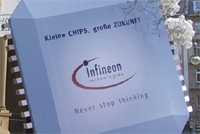 “Size without profit is useless,” says Peter Bauer, head of chipmaker Infineon, against critics of the sale of the mobile-phone chip division to US competitor Intel. For 1.4 billion US dollars in cash, the Americans are to buy the wireless solutions business (WLS) by the end of March 2011, and continue to run it as an independent business unit. The division became the biggest turnover producer at the German chip specialist in the current quarter. With the sale, the three business sectors of car electronics, industrial electronics and chip-card technology stay with the group; they will be strengthened by the sale, says Bauer. It is initially unclear whether Infineon will let its shareholders share in the WLS proceeds through a dividend. A special distribution or a share buyback have been ruled out by Bauer. The balance-sheet figures for the business year ending on 30 September are to be presented on 16 November.
“Size without profit is useless,” says Peter Bauer, head of chipmaker Infineon, against critics of the sale of the mobile-phone chip division to US competitor Intel. For 1.4 billion US dollars in cash, the Americans are to buy the wireless solutions business (WLS) by the end of March 2011, and continue to run it as an independent business unit. The division became the biggest turnover producer at the German chip specialist in the current quarter. With the sale, the three business sectors of car electronics, industrial electronics and chip-card technology stay with the group; they will be strengthened by the sale, says Bauer. It is initially unclear whether Infineon will let its shareholders share in the WLS proceeds through a dividend. A special distribution or a share buyback have been ruled out by Bauer. The balance-sheet figures for the business year ending on 30 September are to be presented on 16 November.
Siemens favours shareholders
 Public prosecutors in Vienna began investigations in September against two former Siemens employees suspected of bribery payments. Through camouflage firms, they are alleged to have paid business partners in Romania, Bulgaria and Bosnia and Herzegovina for alleged consulting and lobby services, without the corresponding services actually having been provided. Austrian newspaper “Der Standard” cites a figure of €600,000. Allegedly the two managers regularly went to head office in Munich and took the money from there to South-East Europe.
Public prosecutors in Vienna began investigations in September against two former Siemens employees suspected of bribery payments. Through camouflage firms, they are alleged to have paid business partners in Romania, Bulgaria and Bosnia and Herzegovina for alleged consulting and lobby services, without the corresponding services actually having been provided. Austrian newspaper “Der Standard” cites a figure of €600,000. Allegedly the two managers regularly went to head office in Munich and took the money from there to South-East Europe.
The conglomerate’s balance sheet is also coming under fire. In mid September it became known that Siemens will still have to be recording write-offs amounting to €1.4 billion in its diagnostics division in the fourth quarter of the business year ending in 30 September. These would not however affect payments, said the group. The division came into existence through the purchases of the firms DPC, Bayer Diagnostics and Dade Behring in 2006 and 2007. Altogether, Siemens laid 11 billion euros on the table for the purchases.
Siemens also announced that it would in future be distributing to shareholders a fixed proportion of its profits in a form of a dividend. The exact figure will be announced in November. The share buyback programme started in November 2007 had been stopped during the crisis. Additionally, the employment pact for the 128,000 employees in Germany, expiring in September, was extended until 2013.
ThyssenKrupp clears the decks
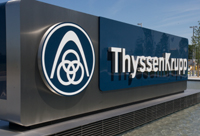 Materials and technology group ThyssenKrupp will from now on be doing no more new business with Iran, thus following the sanctions policy of the Federal Republic of Germany, the EU and the US, stated Thyssen CEO Ekkehard Schulz in mid September. The group is thus going beyond the sanction measures in the petroleum sector. Existing involvements in Iran will according to the board decision be terminated as soon as possible.
Materials and technology group ThyssenKrupp will from now on be doing no more new business with Iran, thus following the sanctions policy of the Federal Republic of Germany, the EU and the US, stated Thyssen CEO Ekkehard Schulz in mid September. The group is thus going beyond the sanction measures in the petroleum sector. Existing involvements in Iran will according to the board decision be terminated as soon as possible.
The steel group has also managed to find a solution for its participation in Greek dockyards Hellenic Shipyards (HSY), thus withdrawing further out of the lossmaking shipyard business. ThyssenKrupp Marine Systems, Abu Dhabi Mar (ADM) and the Greek government were able after months of negotiations to agree that Thyssen can sell a 75.1% share to Arab investors. With the remaining 24.9%, Thyssen will continue to be involved in HSY. With the latest deal, it was long controversial whether the Greek government would pay the shipyard €2.85 billion for four submarines ordered in 2000 or not. 80% of the value of the contract had been paid in advance. In early September the EU Commission also approved the merger of ThyssenKrupp’s shipbuilding business with Abu Dhabi Mar. ADM will accordingly takeover the civil shipbuilding division of the Blohm & Voss yard and the civil sections of Howaldtswerke-Deutsche Werft.
TUI becomes a tourism group
 The tourism and shipping group TUI will in the foreseeable future get rid of its 43% holding in shipping company Hapag-Lloyd, thus becoming a pure tourism provider. After the immense downturn by the Hamburg shipping firm, in 2008 TUI sold the bulk of the Hapag-Lloyd shares to the Albert-Ballin-Konsortium. Now the shipping company is sailing in profitable waters again, so that the Hamburg company’s Supervisory Board was able to set comprehensive refinancing going. In course of this the shipping company will place a company loan and secure a syndicated credit. As a condition of this, Hapag-Lloyd will pay back the €1.2 billion state guarantee, enabling the Hamburgers to resume interest payments for a company loan to TUI and pay back a bridging loan of €227 million. In October, the Hanover group will take in €65 million in delayed interest claims. A further loan of €350 million is being converted to equity by 2010, so that TUI will then hold 49.8% of the Hapag-Lloyd share. This comprehensive refinancing is the condition for the tourism group to be able to sell its shares in Hapag-Lloyd. The Ballin-Konsortium has a pre-emption right on the shares held by TUI. The proceeds from selling the shipping-company shares are to be used for the complete takeover of the British subsidiary TUI Travel, in which TUI currently holds 57% of the shares. Along with Russian steel millionaire Alexei Mordashov, who indicated he was expanding his holding in the Hanover company to 25-30%, TUI CEO Michael Frenzel will in future be expanding internationally.
The tourism and shipping group TUI will in the foreseeable future get rid of its 43% holding in shipping company Hapag-Lloyd, thus becoming a pure tourism provider. After the immense downturn by the Hamburg shipping firm, in 2008 TUI sold the bulk of the Hapag-Lloyd shares to the Albert-Ballin-Konsortium. Now the shipping company is sailing in profitable waters again, so that the Hamburg company’s Supervisory Board was able to set comprehensive refinancing going. In course of this the shipping company will place a company loan and secure a syndicated credit. As a condition of this, Hapag-Lloyd will pay back the €1.2 billion state guarantee, enabling the Hamburgers to resume interest payments for a company loan to TUI and pay back a bridging loan of €227 million. In October, the Hanover group will take in €65 million in delayed interest claims. A further loan of €350 million is being converted to equity by 2010, so that TUI will then hold 49.8% of the Hapag-Lloyd share. This comprehensive refinancing is the condition for the tourism group to be able to sell its shares in Hapag-Lloyd. The Ballin-Konsortium has a pre-emption right on the shares held by TUI. The proceeds from selling the shipping-company shares are to be used for the complete takeover of the British subsidiary TUI Travel, in which TUI currently holds 57% of the shares. Along with Russian steel millionaire Alexei Mordashov, who indicated he was expanding his holding in the Hanover company to 25-30%, TUI CEO Michael Frenzel will in future be expanding internationally.
Piëch settles inheritance
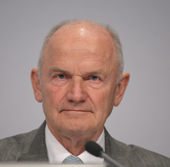 “I have the secured future of our companies at heart,” dictated automobile patriarch Ferdinand Piëch in September to the notebooks of journalists from the weekly Focus. It is the Porsche grandson’s declared aim to raise Volkswagen by 2018, following the announced merger with Porsche, to number one in the world, above Toyota. But in order to prevent his inheritance in the billions from being broken up amongst his twelve children, he has placed his share of just over 7% of Porsche and the 10% he holds in Europe’s biggest car trader, Porsche Holding in Salzburg, in two Austrian foundations. According to their charters, shares may be sold only if at least nine heirs, the board and the foundations’ advisory council all agree. While some of his children are considering legal steps against the foundations’ model, the VW Supervisory Board chair and Porsche Supervisory Board member is sure that he will be able to take VW to the top only if there are stable ownership relations.
“I have the secured future of our companies at heart,” dictated automobile patriarch Ferdinand Piëch in September to the notebooks of journalists from the weekly Focus. It is the Porsche grandson’s declared aim to raise Volkswagen by 2018, following the announced merger with Porsche, to number one in the world, above Toyota. But in order to prevent his inheritance in the billions from being broken up amongst his twelve children, he has placed his share of just over 7% of Porsche and the 10% he holds in Europe’s biggest car trader, Porsche Holding in Salzburg, in two Austrian foundations. According to their charters, shares may be sold only if at least nine heirs, the board and the foundations’ advisory council all agree. While some of his children are considering legal steps against the foundations’ model, the VW Supervisory Board chair and Porsche Supervisory Board member is sure that he will be able to take VW to the top only if there are stable ownership relations.
To bring his vision of a full-range car group with a product portfolio ranging from small cars up to 40-tonners closer, the utility-vehicle business is also to be expanded. Even before the formal foundation of a lorry division in October, VW has appointed top-grade managers to bring forward cooperation between the two utility-vehicle holdings in MAN (VW share some 30%) and Scania (70%). The first thing to aim at in this joint development is to be rear axles and gearboxes. MAN CEO Georg Pachta-Reyhofen does not, despite the closer connections, expect VW to expand its holdings in the Munich utility-vehicle maker.
Raid on British Daimler offices
 The British antitrust authority, the Office of Fair Trade (OFT), has searched Daimler offices near Milton Keynes northwest of London. The British competition watchdogs suspect the world’s biggest utility-vehicle maker and several leading lorrymakers (MAN, Renault, Scania and Volvo) of illegal price agreements on the British market for utility vehicles. One person had been arrested and released on bail, said a spokesman for the British authority. Daimler in Stuttgart stated it was cooperating closely with the OFT. The Italian Fiat group, to which lorrymaker Iveco belongs, will also be cooperating with the regulator. According to a report in the newspaper “La Repubblica” for 22 September, the Swabians allegedly want to buy the Italians’ whole industrial division, but at least the lorry brand Iveco it owns. While both sides are attempting to minimize matters, the German carmaker allegedly already held talks in summer with Fiat and offered nine billion Euros. Fiat had however asked for 10.5 billion.
The British antitrust authority, the Office of Fair Trade (OFT), has searched Daimler offices near Milton Keynes northwest of London. The British competition watchdogs suspect the world’s biggest utility-vehicle maker and several leading lorrymakers (MAN, Renault, Scania and Volvo) of illegal price agreements on the British market for utility vehicles. One person had been arrested and released on bail, said a spokesman for the British authority. Daimler in Stuttgart stated it was cooperating closely with the OFT. The Italian Fiat group, to which lorrymaker Iveco belongs, will also be cooperating with the regulator. According to a report in the newspaper “La Repubblica” for 22 September, the Swabians allegedly want to buy the Italians’ whole industrial division, but at least the lorry brand Iveco it owns. While both sides are attempting to minimize matters, the German carmaker allegedly already held talks in summer with Fiat and offered nine billion Euros. Fiat had however asked for 10.5 billion.
Accusations against Obermann
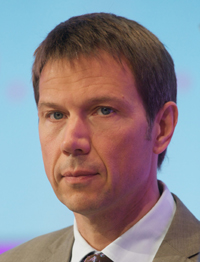 Bonn public prosecutors have commenced investigations against René Obermann on accusations of bribery in Macedonia and Montenegro. According to the brief, officials accused Deutsche Telekom managers of having negotiated a sort of secret agreement with the Macedonian government. For instance, non-issue of a third mobile-telephony licence is said to have been associated in a secret agreement with dividend payments in the millions to the Macedonian government. Obermann is said to have been kept up to date on the state of the negotiations with the Macedonian government in e-mails, and proof of this is allegedly in the possession of the investigators. The CEO of the Bonn telephone company rejects the criminal accusations against it as false, as Telekom went on to state. The occasion for the large-scale searches two weeks ago was a request from America for judicial assistance, said Bonn public prosecutor Friedrich Apostel. Irrespective of the investigations, the Telekom Supervisory Board wishes to renew Obermann’s board contract.
Bonn public prosecutors have commenced investigations against René Obermann on accusations of bribery in Macedonia and Montenegro. According to the brief, officials accused Deutsche Telekom managers of having negotiated a sort of secret agreement with the Macedonian government. For instance, non-issue of a third mobile-telephony licence is said to have been associated in a secret agreement with dividend payments in the millions to the Macedonian government. Obermann is said to have been kept up to date on the state of the negotiations with the Macedonian government in e-mails, and proof of this is allegedly in the possession of the investigators. The CEO of the Bonn telephone company rejects the criminal accusations against it as false, as Telekom went on to state. The occasion for the large-scale searches two weeks ago was a request from America for judicial assistance, said Bonn public prosecutor Friedrich Apostel. Irrespective of the investigations, the Telekom Supervisory Board wishes to renew Obermann’s board contract.
Buhlmann's Corner
Germany the developing country
 The Deutsche Bank collects a 10 billion capital increase – and everyone says “Wow!” Days later, the Brazilians collect five times that – i.e. eight percent of the market value of the entire DAX 30, including Deutsche Bank – or one whole Daimler.
The Deutsche Bank collects a 10 billion capital increase – and everyone says “Wow!” Days later, the Brazilians collect five times that – i.e. eight percent of the market value of the entire DAX 30, including Deutsche Bank – or one whole Daimler.
The Brazilian oil boys could pay for all of Hochtief 11.6 times over from the recapitalization. But the Spaniards of ACS do not want Hochtief so quickly – they want to act as slowly as Porsche did with Volkswagen. The Spanish Piëch too, ACS CEO Florentino Pérez, is the major shareholder, has his own football club and bought his first company for one peseta. That would be funny – “Dr.Lü” (Hochtief CEO Herbert Lütkestratkötter) tells himself – were it not that all this parallelism ends up with a reverse take-over. So he saves. He starts with the Supervisory Board and forms a rump one (without the two ACS representatives). They manifestly need tutoring in Corporate Governance – otherwise non-discharge is inevitable. Naturally, with this insoluble conflict of interest the appointment should immediately be suspended and finally terminated.
You can already see consultants sailing up and down the Rhine with §33 WpÜG to update companies’ statutes, and their fees. If ACS were only a family from Herzogenaurach, or Austrians were the ones pulling the strings – but the Ruhr baron does not want to offer himself to a Spaniard. Why not, actually? They managed to build their country over so successfully that no one even noticed that no one can pay for it. They have America under their thumb, to the extent that one highway accident need not mean replacing the throttles of millions of vehicles.
Of course, Dr.Lü has that too – but unfortunately “only” in Oceania. That makes a link-up make all the more sense. After all, alongside their sporting successes the Spaniards are going to finally need balances that make them eligible to play. Why is Europe actually there only between Strasbourg and the Manneken Pis in Brussels? Perhaps the ad-hoc supervisory-board members can see a little farther than the injured “no-one-asked-me” CEO. For it should not be the criteria of Der Spiegel that matter for company officers and their opinions, but those of the caring family man – a better future for all stakeholders.
So in this way, Germany too is a developing country. It will be interesting to see which ex-CEO is first to become Supervisory Board chair without a cooling-off period. Bayer CEO Werner Wenning might deserve it; he’s going on 30 September 2010, leaving a new, strong Bayer behind.
ACTIONS CORNER
The Hessian Regional Labour Tribunal in Frankfurt has thrown out an appeal by 14 ex investment bankers from the former Dresdner Bank for full payment of their 2008 bonuses in the millions. Proceedings began on 20 September. The former Dresdner Kleinwort Investment Bank employees had already failed in an action before the Frankfurt Labour Tribunal, and now the higher court has found on appeal for Commerzbank, which had taken over the bank in 2009. Commerzbank had considerably reduced the bonuses after taking over Dresdner.
Daimler has paid Jürgen Grässlin the bulk of his costs of legal cases against the group, in a settlement. The best-known Daimler critic’s lawyer, Holger Rothbauer, confirmed a report to this effect in "Stuttgarter Nachrichten" on 9 September. The amount was in the high five digits. In return the Freiburg schoolteacher and author undertook in writing no longer to repeat particular accusations against Jürgen Schrempp and Dieter Zetsche. A year ago Grässlin won an action against the former CEOs in the Federal Court of Justice.
In the US, Daimler and Cerberus were sued by over 450 former Chrysler employees on 10 September. The former owners are claimed to be responsible for their company pensions, which they lost with the bankruptcy of the US carmaker last year. Losses of some 100 million dollars are involved. Both are accused of not having done enough to ring-fence the pension claims. Chrysler itself is explicitly excluded from claims. In 2007 Daimler transferred 80.1% of the shares to the financial investor, giving it control over Chrysler.
In the view of judge Dietrich Brand, Deutsche Bank made mistakes and offered a highly speculative financial product although it must have known that municipalities are not supposed to speculate with tax money. Accordingly, the city of Ravensburg and three further municipalities have won a partial victory in the lawsuit against the bank before Stuttgart Higher Regional Court for risky interest bets. Deutsche Bank was obliged to pay compensation for damages because it had not given advice in accordance with its duties. Brand called on both parties to talk together and reach a settlement, before he took his decision on 27 October.
The dispute between Deutsche Telekom and T-Online minority shareholders suing it reached an unappealable conclusion on 8 September before Frankfurt Higher Regional Court. According to the judgment, Telekom has to pay the shareholders in its once-listed former subsidiary a total of some 200 million Euros. The judges thus confirmed a decision by Frankfurt Regional Court which found an original payment of €1.15 per share in cash plus interest appropriate in connection with the merger of parent and subsidiary in June 2006.
Nürnberg-Fürth Regional Court has condemned Wilhelm Schelsky to pay Siemens compensation of €3.2m for damages. At the same time, the court rejected the action by the former head of employee organization AUB against his former employer for payment of alleged outstanding emoluments amounting to €391,000. The court found it was indisputable that Schelsky had diverted part of the Siemens payments totalling 30 million Euros to the AUB for his private purposes. Whether he is at all able to pay the amount is however not yet clear. During the trial Schelsky declared he is destitute.
AGM Dates
| Company | Event | Date | Time | Place | Address | Event |
| MDAX | ||||||
| Kabel Deutschland | ord.AGM | 20.10.2010 | 10:00 | 80333 München | Max-Joseph-Straße 5, Haus der Bayerischen Wirtschaft | 09.09.2010 |
| The Agenda for the ordinary AGM of Kabel Deutschland Holding AG starts with the usual items, like presentation of annual accounts and discharge to the company bodies. The remuneration system for board members is to be approved. Supervisory Board pay is to be adjusted. Additionally, several charter amendments are to be decided. | ||||||
| TecDAX | ||||||
| SMARTRAC | extraord.AGM | 21.10.2010 | 12:00 | NL-1077 XV Amsterdam | Strawinskylaan 1999, in the NautaDutilh law offices | 09.09.2010 |
| The Agenda for the extraordinary AGM of SMARTRAC N.V. starts with discussion of the public takeover bid by OEP Technologie B.V. Additionally, Mr Christopher von Hugo and Dr. Jörg Zirener are to be elected to the Supervisory Board. | ||||||
Politics
BaFin tests banks’ Supervisory Board members
 Since the Bundestag tightened up the credit industry in summer, the Federal Institution for Financial Services Oversight (BaFin) has been testing the competence of Supervisory Board members of German banks. The new powers may mean that banks’ Supervisory Board members are dismissed, or even barred from so working. Currently ten dismissal proceedings are in hand, stated the head of the oversight organization, Christoph Crüwell. Initially, BaFin was merely hearing those concerned. Crüwell however expects those involved perhaps to resign voluntarily. One of the bank Supervisory Board members tested is accused by the panel of understanding too little about banking business; three others have too many Supervisory Board posts. With the remaining six, the Bonn authority doubts their reliability. If along with his post a Supervisory Board member has a credit with the bank, according to BaFin there is a conflict of interest.
Since the Bundestag tightened up the credit industry in summer, the Federal Institution for Financial Services Oversight (BaFin) has been testing the competence of Supervisory Board members of German banks. The new powers may mean that banks’ Supervisory Board members are dismissed, or even barred from so working. Currently ten dismissal proceedings are in hand, stated the head of the oversight organization, Christoph Crüwell. Initially, BaFin was merely hearing those concerned. Crüwell however expects those involved perhaps to resign voluntarily. One of the bank Supervisory Board members tested is accused by the panel of understanding too little about banking business; three others have too many Supervisory Board posts. With the remaining six, the Bonn authority doubts their reliability. If along with his post a Supervisory Board member has a credit with the bank, according to BaFin there is a conflict of interest.
BGH blocks professional claimant
In 2007 Frankfurt Regional Court had already ruled that the action for avoidance by professional claimant Klaus Zapf and his lawsuit firm Pomoschnik against Nanoinvest AG (today Real Estate International) was contra bonos mores. The court then sentenced him to pay compensation for abuse of law. Zapf had demanded 3,500 option rights on new Nanoinvest shares to withdraw his lawsuit and those of four fellow plaintiffs. The court ruled that 38 options each would be appropriate. On appeal, the 2009 ruling was confirmed by Frankfurt Higher Regional Court. Now the Federal Court of Justice (BGH) has rejected Zapf’s appeal against non-admission of further appeal. That makes the original ruling unappealable. How much money the removal-firm owner will have to pay Real Estate International is for the moment unclear.
New financial oversight in the EU and in Germany
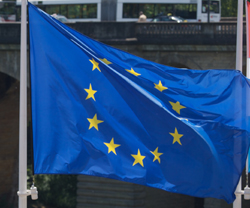 In mid September the European Parliament agreed to the new arrangements for financial oversight in the EU. While the model now adopted means that from the beginning of 2011 national watchdogs will continue to operate in day-to-day business, for the first time national financial oversight will if necessary have to follow instructions from the three new EU authorities. These are the EU Banking Authority (EBA) in London, the European Securities and Markets Authority (ESMA) in Paris and the EU Insurance and Occupational Pensions Authority (EIOPA) in Frankfurt. The new authorities, each with a director and 60 to 70 employees, can give banks, exchanges and insurance companies direct instructions in crises and emergencies, bypassing national watchdogs. The individual States can veto EU decisions only if they infringe their budget sovereignty. Additionally, the EBA will in future regularly subject banks to stress tests, and the ESMA take charge of licensing rating agencies, as well as being able in emergencies to ban certain derivatives, or trading techniques like short-selling. To supplement the new authorities, a risk board to signal impending dangers to the financial system. The European Systemic Risk Board (ESRB) will be set up as an agency under the European Central Bank, though able to make only non-binding orders. The board is to have central bankers and academics on it. The ECB President will initially head the body for five years. After a review it may also be possible for a non-Euro State such as Britain to take over the chair. On the model just adopted, the EU has abandoned a unitary super-watchdog.
In mid September the European Parliament agreed to the new arrangements for financial oversight in the EU. While the model now adopted means that from the beginning of 2011 national watchdogs will continue to operate in day-to-day business, for the first time national financial oversight will if necessary have to follow instructions from the three new EU authorities. These are the EU Banking Authority (EBA) in London, the European Securities and Markets Authority (ESMA) in Paris and the EU Insurance and Occupational Pensions Authority (EIOPA) in Frankfurt. The new authorities, each with a director and 60 to 70 employees, can give banks, exchanges and insurance companies direct instructions in crises and emergencies, bypassing national watchdogs. The individual States can veto EU decisions only if they infringe their budget sovereignty. Additionally, the EBA will in future regularly subject banks to stress tests, and the ESMA take charge of licensing rating agencies, as well as being able in emergencies to ban certain derivatives, or trading techniques like short-selling. To supplement the new authorities, a risk board to signal impending dangers to the financial system. The European Systemic Risk Board (ESRB) will be set up as an agency under the European Central Bank, though able to make only non-binding orders. The board is to have central bankers and academics on it. The ECB President will initially head the body for five years. After a review it may also be possible for a non-Euro State such as Britain to take over the chair. On the model just adopted, the EU has abandoned a unitary super-watchdog.
After the rearrangement at the EU level, a new oversight system for Germany is also crystallizing out. After the initial attempt by the black-yellow coalition in June had to be postponed because of disagreements between coalition parties FDP and CDU, Federal Finance Minister Wolfgang Schäuble indicated in September that he could imagine a similar model for Germany to the one at EU level. This would make the Bundesbank responsible for the stability of the system, and BaFin for specific individual cases. In general, Schäuble rejects having the Bundesbank centralize all financial oversight, with BaFin’s divisions falling under the Bundesbank’s umbrella. Schäuble did not set out any concrete timetable for the new arrangements in Germany.
Basel III ready for decision
 So that in future it will no longer be the taxpayer who has to come in to rescue banks, the finance ministers of the G20 countries are likely at their November meeting in Seoul, South Korea, to adopt stricter rules for credit institutions. The central bankers and banking watchdogs of 27 States initiated the draft in September. The new arrangements, known as Basel III, provide that banks will in future have to keep six percent of their risk-weighted assets as core capital instead of the current four. The so-called hard capital reserves should be 4.5%. On top of this will be a buffer for bad times of a further 2.5%. Individual countries can additionally set a further buffer of 2.5%. The rules are to be introduced gradually from 2013 until the end of 2018. It is expected that banks will in future retain profits, cut dividends and place capital increases on the market in order to strengthen their capital reserves.
So that in future it will no longer be the taxpayer who has to come in to rescue banks, the finance ministers of the G20 countries are likely at their November meeting in Seoul, South Korea, to adopt stricter rules for credit institutions. The central bankers and banking watchdogs of 27 States initiated the draft in September. The new arrangements, known as Basel III, provide that banks will in future have to keep six percent of their risk-weighted assets as core capital instead of the current four. The so-called hard capital reserves should be 4.5%. On top of this will be a buffer for bad times of a further 2.5%. Individual countries can additionally set a further buffer of 2.5%. The rules are to be introduced gradually from 2013 until the end of 2018. It is expected that banks will in future retain profits, cut dividends and place capital increases on the market in order to strengthen their capital reserves.
For German banks too the new rules mean that they will have to expand their equity capital by 2019. A confidential Deutsche Bundesbank study has estimated the financial requirements for this at 90 billion euros, with the ten biggest German institutions alone needing €50 billion, says the Bundesbank. The Federal Association of Public Banks in Germany (VÖB) criticized Basel III as a regulatory leap in the dark. The arrangements would immensely shrink credit-providing possibilities and lead to a credit squeeze on small business.
EU wants more Corporate Governance
Many Corporate Governance rules are voluntary in nature and not equipped with legal force. The EU Commission thinks so, according to the Green Paper on Corporate Governance in Financial Institutions and Remuneration Policies presented in summer by the Commission, seeing it as one of the causes of the inadequacies that emerged during the financial crisis. According to EU director Pierre Delsaux, there was too little communication between those involved in the financial firms and the oversight authorities. The EU Commission wishes in this connection to reveal proposals for the composition of the bodies, the duration of appointments and qualifications for Supervisory Board posts.
People
 Bayerische Motoren Werke have extended Norbert Reithofer’s contract early by a further five years, until the end of August 2016. The 54-year-old has been a board member of the carmaker since 16 March 2000, and CEO since September 2006. The Munich firm announced this following a Supervisory Board meeting chaired by Joachim Milberg.
Bayerische Motoren Werke have extended Norbert Reithofer’s contract early by a further five years, until the end of August 2016. The 54-year-old has been a board member of the carmaker since 16 March 2000, and CEO since September 2006. The Munich firm announced this following a Supervisory Board meeting chaired by Joachim Milberg.
Kenneth D. Reid, who has worked for Bilfinger Berger since 1990 and is currently responsible on the board for Power Services and Concessions, has left “by mutual agreement”. Joachim Enenkel, current management chair of Bilfinger Berger Ingenieurbau, is succeeding the 54-year old Scot. Herbert Bodner, whose contract expires in mid-2011, was appointed CEO.
As new board member at Celesio, on 1 October Michael Lonsert took on overall responsibility for the Manufacturer Solutions business sector and for the Medco Celesio Joint Venture, announced the pharmaceuticals wholesaler on 9 September. The executive had already worked for the pharmacy operator and been responsible there since 2008 for building up and expanding the sectors he has now taken over.
 Jörg Spiekerkötter is leaving Conergy at the end of October at his own request, on expiry of his contract. Sebastian Biedenkopf is becoming the solar firm’s new CFO. Currently in-house lawyer, he moved immediately onto the board to work himself into his new tasks. Only in mid-August Andreas von Zitzewitz, who had been supposed to become CEO, surprisingly left the company.
Jörg Spiekerkötter is leaving Conergy at the end of October at his own request, on expiry of his contract. Sebastian Biedenkopf is becoming the solar firm’s new CFO. Currently in-house lawyer, he moved immediately onto the board to work himself into his new tasks. Only in mid-August Andreas von Zitzewitz, who had been supposed to become CEO, surprisingly left the company.
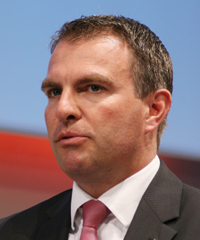
The designated successor to departing CEO Wolfgang Mayrhuber at Deutsche Lufthansa at the turn of the year will be current deputy CEO Christoph Franz. The Supervisory Board so decided on 22 September. The tasks of the current head of the important board sector Lufthansa Passage have been taken on by the present head of freight Carsten Spohr.
Fraport announced changes on the company’s Supervisory Board on 9 September. Stefan H. Lauer and Klaus-Dieter Scheurle are being newly appointed to it. They will thus be taking up the Supervisory Board seats that became free in the middle of the year. Lufthansa board member Lauer will be succeeding Lufthansa CEO Wolfgang Mayrhuber on the airport operator’s Supervisory Board. Scheurle, a civil servant as state secretary in the Federal Ministry for Transport, Construction and Urban Development, succeeds airline Air Berlin’s board appointee for politics and transport rights, Matthias von Randow.
Freenet has found its new CFO from within the firm. Joachim Preisig replaces Axel Krieger, taking office on 1 October, announced the mobile telephony provider on 27 August. As already expected, Preisig will accordingly move from his current post as chief operations and integration officer (COO). His current duties and tasks will be divided among other board members, and there will be no new COO.
Peter Wenzel has been appointed shareholder member on the Supervisory Board of Hamburger Hafen und Logistik by Hamburg District Court. On the Supervisory Board the recently appointed state councillor on the Hamburg authority for business and labour takes the place of Carsten Frigge, who on 31 March was elected Hamburg financial senator and in August resigned his post as Supervisory Board member.
Bruno Piacenza (44) is to take over from Friedrich Stara on the Henkel board in early March 2011, taking the laundry and home-care spot. The 61-year-old Austrian turns 62 then and will be departing in accordance with internal rules. By birth French, Piacenza has worked for 20 years with the DAX company in the cosmetics business.
After 25 years of operational activity, Carsten Pedersen has moved to the Nordex Supervisory Board. He takes the place of Kai Brandes, stated the group in a press release on 7 September. Lars Bondo Krogsgaard (44) succeeded the founder and long-term sales chief, becoming new sales chief at the wind-plant maker on 1 October.
The new head of finance at Praktiker Bau- und Heimwerkermärkte Holding is Markus Schürholz, “with immediate effect“. The previous CFO Thomas Ghabel left the board because of differences of opinion, stated the DIY chain on 15 September. Personnel officer Karl-Heinz Stroh has also left the company, in the best of agreement with the Supervisory Board according to statements.
 RWE is reducing its board to five members. Ulrich Jobs, hitherto in charge of international business, left the management team on 30 September. His duties are being taken over by strategy director Leonhard Birnbaum and Germany head Rolf Martin Schmitz. As the energy group stated on 23 September, the separation was “by mutual agreement”.
RWE is reducing its board to five members. Ulrich Jobs, hitherto in charge of international business, left the management team on 30 September. His duties are being taken over by strategy director Leonhard Birnbaum and Germany head Rolf Martin Schmitz. As the energy group stated on 23 September, the separation was “by mutual agreement”.
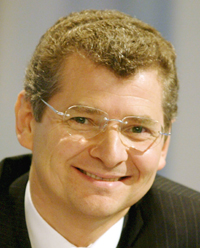 Edwin Eichler has been court-appointed to the Supervisory Board of SGL Carbon. The Thyssen-Krupp board member is replacing Claus Hendricks, a member of the group’s Supervisory Board for fourteen years, who died in April following a brief but severe illness. Eichler is to be elected to the Supervisory Board on 3 May 2011 by the AGM, for five years.
Edwin Eichler has been court-appointed to the Supervisory Board of SGL Carbon. The Thyssen-Krupp board member is replacing Claus Hendricks, a member of the group’s Supervisory Board for fourteen years, who died in April following a brief but severe illness. Eichler is to be elected to the Supervisory Board on 3 May 2011 by the AGM, for five years.
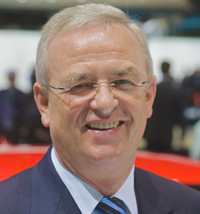 Martin Winterkorn is to head Volkswagen for longer than was so far known. Since he took the helm, Volkswagen has been building more cars every year, stated Supervisory Board member Bernd Osterloh. “We on the Supervisory Board will extend our CEO Dr. Winterkorn’s contract by further years,” said the chair of the overall and group Works Council, stating the line of the employee side.
Martin Winterkorn is to head Volkswagen for longer than was so far known. Since he took the helm, Volkswagen has been building more cars every year, stated Supervisory Board member Bernd Osterloh. “We on the Supervisory Board will extend our CEO Dr. Winterkorn’s contract by further years,” said the chair of the overall and group Works Council, stating the line of the employee side.
Campus
IR 2.0
 Social networks like Twitter, Facebook or YouTube are now part of everyday life. What is being called Web 2.0 thus also offers new opportunities for investor-relations work, and accordingly the University of St. Gallen, commissioned by the Deutscher Investor Relations Verband (DIRK), has studied the use of these media in everyday IR. The outcome of the IR 2.0 study is not surprising: of the biggest firms, the top 100 in the Fortune Global 500, 79% are already employing Web 2.0 applications for their IR work. However, there are only a few firms which, like Google or Yahoo, use social media as their only publication channel and do without traditional media. With users too, the trend is clear: 85% of financial service professionals under 50 rely on use of social networks; 58% of institutional investors and sell-side analysts in the US and Europe stated that from their viewpoint these media will become increasingly important for their investment decisions.
Social networks like Twitter, Facebook or YouTube are now part of everyday life. What is being called Web 2.0 thus also offers new opportunities for investor-relations work, and accordingly the University of St. Gallen, commissioned by the Deutscher Investor Relations Verband (DIRK), has studied the use of these media in everyday IR. The outcome of the IR 2.0 study is not surprising: of the biggest firms, the top 100 in the Fortune Global 500, 79% are already employing Web 2.0 applications for their IR work. However, there are only a few firms which, like Google or Yahoo, use social media as their only publication channel and do without traditional media. With users too, the trend is clear: 85% of financial service professionals under 50 rely on use of social networks; 58% of institutional investors and sell-side analysts in the US and Europe stated that from their viewpoint these media will become increasingly important for their investment decisions.
The foreword as signboard
The foreword, the welcome and the letter to shareholders are as it were the signboard of a business report, encouraging readers to read further. In its August survey, geschäftsberichte-portal found that 71% of respondents rated the foreword as very important. Almost two thirds stated that the CEO rather than the whole board should write the foreword. And all were agreed that the letter should be personalized with a hand-written signature, and in any case accompanied by an individual photo. The text should address the reader directly and use the words I and we. Some 70% favoured a personal mode of address like “we are reporting to you”. However, only half think formulations like “it is my opinion” should be used. 80% stated that key figures from the result do not belong in the foreword, but 90% want, instead of those, indications of important events. Respondents were agreed that the foreword should sketch out the key notes of strategy and set forth the business prospects. 40% of the IR managers surveyed were satisfied with the content and language of the present foreword of their current business report, and another 20% were very satisfied.
Shares still out of favour
German investors continue to be skeptical about investing in shares. 34% of the 1,020 securities owners surveyed by dwp bank are planning to include fewer shares in their portfolios in future - only 14% want to raise their exposure to shares. Last year 56% of respondents still wanted to reduce their holdings.
Buy recommendations down
For the first time since 1997, fewer than 29% of shares rated by brokers worldwide were regarded as a buying opportunity. A further 54% were rated “neutral”. This is confirmed by almost 160,000 ratings by analysts in the Bloomberg figures. Research further shows that analysts are convinced that in the next quarter firms’ profits will rise by an average of around 36%, the biggest raise since 1988. Critics suspect that this is based only on a short-term boom in consumer expenditure.
Capital News
Deutsche Bank took in some €10.2 billion gross from its share issue, thus girding itself up for the takeover of Postbank and the new financial-market regulations. As the DAX group announced on 20 September, the reference price for the 308.6 million new shares was set at €33.00. According to the bank’s indications, after fees and dividend costs the banks should take in some €9.9 billion. Shareholders can still exercise option rights until 5 October. This was the biggest capital increase in the bank’s history. Postbank is to be consolidated in the current year. Currently, Deutsche Bank holds 29.95% of the Postbank shares.
Through its third high-interest bond within twelve weeks, Continental managed to secure a further €1.25 billion, on surprisingly favorable terms. The first tranche runs through 2016, with fixed interest of 6.5% per year, and 7.25% for the part due in 2018. For both periods, volumes of €625 million each were taken up. The proceeds – as with the two earlier bonds – are to be used to partly pay back the bank’s commitments. The 3 billion euros taken in from the three high-interest bonds in three months will be rectified and mature in staggered fashion between 2015 and 2018.
Heidelberger Druckmaschinen has completed its recently decided capital increase of some €420 million to fill out its balance sheet. The reference price for the 155,286,868 new shares was only €2.70. With the proceeds, the struggling printing-press maker, rescued last year with €850 million in State aid, will pay back some of the aid, thus lowering interest costs. The reference period ran from 14 September to 27 September. The capital increase is guaranteed by banks. First trading in the new shares is scheduled for 28 September 2011.
Q-Cells has stated it is issuing 58.765.955 new shares against cash contributions, and a convertible bond with an issue volume of probably 130-140 million euros. This will raise the registered capital to €176.3 million. The solar-cell maker will take a further €120 million or so from the capital increase if it is fully placed. The reference period for both measures started on 29 September. The funds raised are to be made available to the extent of €275 million to buy back an existing convertible loan of €492.5 million (period 2007/2012). What is to happen with the remaining €217.5 million in the convertible remains open.
In a capital increase Sky Deutschland has taken in much less, at €177.4 million, than it had planned, namely €282 million. The reference period ended on 28 September. Only 168,937,926 new shares out of 269,580,929 offered were issued. The pay-TV channel was thus left holding one in three shares. Murdoch’s share rose to 49.9%. The former Premiere will have to secure the missing funds either from a bigger volume on the convertible bond it has announced, or from a company loan from News Corp.
Director's Dealings
in September
| Company | Person | Function | Buy / Sell | Total value in Euro | Number of shares | Datum |
| adidas | Christian Tourres | SB | S | 7.383.168 | 162.551 | 24.-27.09.2010 |
| AIXTRON | Britta Simroß | B | 34.892 | 2.200 | 27.08.2010 | |
| Carl Zeiss Meditec | Dr. Christian Müller | MB | B | 22.500 | 2.000 | 10.09.2010 |
| centrotherm | Robert Michael Hartung | MB | S | 829.967 | 27.945 | 24.09.2010 |
| centrotherm | TCH GmbH | S | 3.317.104 | 111.687 | 24.09.2010 | |
| centrotherm | Autenrieth Beteiligungs GmbH | S | 14.850.000 | 500.000 | 24.09.2010 | |
| centrotherm | Rolf Hans Hartung | SB | S | 1.936.529 | 65.203 | 24.09.2010 |
| DEUTSCHE BANK | Dr. Josef Ackermann | MB-Head | B | 6.166.479 | 186.863 | 28.09.2010 |
| DEUTSCHE BANK | Dr. Hugo Banziger | MB | S | 133.834 | 36.453 | 28.09.2010 |
| DEUTSCHE BANK | Dr. Hugo Banziger | MB | B | 198.000 | 6.000 | 28.09.2010 |
| DEUTSCHE BANK | Wolfgang Boehr | SB | B | 495 | 15 | 27.09.2010 |
| DEUTSCHE BANK | Börsig, Dr. Clemens | SB-Head | S | 481.204 | 120.001 | 23.-27.09.2010 |
| DEUTSCHE BANK | Börsig, Dr. Clemens | SB-Head | B | 197.109 | 5.973 | 27.09.2010 |
| DEUTSCHE BANK | Gerhild Börsig | S | 4.120 | 1.000 | 27.09.2010 | |
| DEUTSCHE BANK | Gerhild Börsig | B | 19.900 | 1.500 | 01.10.2010 | |
| DEUTSCHE BANK | David Cannon | S | 32.224 | 8.877 | 28.09.2010 | |
| DEUTSCHE BANK | Michael Cohrs | S | 729.720 | 171.220 | 24.-30.09.2010 | |
| DEUTSCHE BANK | Pierre de Weck | S | 4 | 1 | 23.09.2010 | |
| DEUTSCHE BANK | Pierre de Weck | B | 310.761 | 9.417 | 23.09.2010 | |
| DEUTSCHE BANK | Edelmann | S | 11.501 | 2.949 | 23.09.2010 | |
| DEUTSCHE BANK | Jürgen Fitschen | MB | B | 1.859.088 | 56.336 | 30.09.2010 |
| DEUTSCHE BANK | Alfred Herling | SB | S | 1.594 | 387 | 27.09.2010 |
| DEUTSCHE BANK | Alfred Herling | SB | B | 6.600 | 200 | 24.09.2010 |
| DEUTSCHE BANK | Anshu Jain | MB | S | 1.216.571 | 345.597 | 28.09.2010 |
| DEUTSCHE BANK | Anshu Jain | MB | B | 1.227.039 | 37.183 | 28.09.2010 |
| DEUTSCHE BANK | Peter Karzmierczak | SB | S | 3 | 1 | 30.09.2010 |
| DEUTSCHE BANK | Peter Karzmierczak | SB | B | 1.155 | 35 | 30.09.2010 |
| DEUTSCHE BANK | Martina Klee | SB | B | 6.604 | 201 | 28.09.2010 |
| DEUTSCHE BANK | Dr. Michael Kröner | S | 14.074 | 3.416 | 27.09.2010 | |
| DEUTSCHE BANK | Hermann-Josef Lamberti | MB | S | 223.295 | 65.291 | 30.09.2010 |
| DEUTSCHE BANK | Hermann-Josef Lamberti | MB | B | 660.000 | 20.000 | 30.09.2010 |
| DEUTSCHE BANK | Henriette Mark | SB | S | 711 | 209 | 01.10.2010 |
| DEUTSCHE BANK | Henriette Mark | SB | B | 3.300 | 100 | 01.10.2010 |
| DEUTSCHE BANK | Rainer Neske | MB | S | 124.131 | 36.509 | 01.10.2010 |
| DEUTSCHE BANK | Rainer Neske | MB | B | 264.000 | 8.000 | 01.10.2010 |
| DEUTSCHE BANK | Kevin E. Parker | S | 242.586 | 56.346 | 29.09.2010 | |
| DEUTSCHE BANK | Rolf Riemenschnitter | S | 5.653 | 1.653 | 30.09.2010 | |
| DEUTSCHE BANK | Karin Ruck | SB | B | 1.815 | 55 | 29.09.2010 |
| DEUTSCHE BANK | Werner Steinmüller | S | 137.571 | 41.168 | 28.09.-01.10.2010 | |
| DEUTSCHE BANK | Werner Steinmüller | B | 33.000 | 1.000 | 01.10.2010 | |
| DEUTSCHE BANK | Marlehn Thieme | SB | S | 4 | 1 | 27.09.2010 |
| DEUTSCHE BANK | Marlehn Thieme | SB | B | 1.947 | 59 | 23.09.2010 |
| DEUTSCHE BANK | Stefan Viertel | SB | B | 495 | 15 | 25.09.2010 |
| DEUTSCHE BANK | Alexander von zur Mühlen | S | 15.499 | 4.897 | 29.09.2010 | |
| DEUTSCHE BANK | Alexander von zur Mühlen | B | 132.000 | 4.000 | 28.09.2010 | |
| DEUTSCHE BANK | Seth Harisson Waugh | B | 368.973 | 11.181 | 29.09.2010 | |
| Dialog Semiconductor | Jalal Bagherli | MB-Head | S | 443.375 | 41.912 | 09.-14.09.2010 |
| Dialog Semiconductor | Jalal Bagherli | MB-Head | Option | 40.906 | 26.912 | 14.09.2010 |
| Dialog Semiconductor | Peter Weber | MB | Option | 36.092 | 29.828 | 09.09.2010 |
| Dialog Semiconductor | Mark Tyndall | MB | S | 144.314 | 13.118 | 15.09.2010 |
| Dialog Semiconductor | Mark Tyndall | MB | Option | 10.888 | 13.118 | 15.09.2010 |
| Dialog Semiconductor | Jean-Michel Richard | MB | S | 160.969 | 14.817 | 15.09.2010 |
| Dialog Semiconductor | Jean-Michel Richard | MB | Option | 17.336 | 14.817 | 15.09.2010 |
| Dialog Semiconductor | Udo Kratz | MB | S | 335.280 | 30.480 | 15.09.2010 |
| Dialog Semiconductor | Udo Kratz | MB | Option | 21.150 | 30.480 | 15.09.2010 |
| Dialog Semiconductor | Peter Tan Boon Hang | MB | S | 276.060 | 30.000 | 01.09.2010 |
| Dialog Semiconductor | Peter Tan Boon Hang | MB | Option | 98.000 | 70.000 | 01.09.2010 |
| Drillisch | MV Beteiligungs GmbH | B | 120.905 | 23.660 | 27.08.-15.09.2010 | |
| E.ON | Regine Stachelhaus | MB | B | 43.500 | 2.000 | 27.09.2010 |
| E.ON | Dr. Klaus-Dieter Maubach | MB | B | 20.568 | 950 | 17.09.2010 |
| E.ON | Dr. Bernhard Reutersberg | MB | B | 22.695 | 1.000 | 20.08.2010 |
| Evotec | Dr. Werner Lanthaler | MB-Head | B | 46.678 | 20.000 | 30.09.-01.10.2010 |
| Fielmann | Hans Joachim Oltersdorf | SB | B | 129.900 | 2.000 | 31.08.2010 |
| Fraport | Dr. Matthias Zieschang | MB | B | 22.000 | 500 | 27.09.2010 |
| Fraport | Peter Schmitz | MB | B | 20.450 | 500 | 30.08.2010 |
| Fresenius | Dr. Gerd Krick | SB-Head | Option | 674.061 | 25.800 | 09.-30.09.2010 |
| Heidelberger Druck | Dieter Willi Brandt | B | 17.032 | 6.308 | 22.09.2010 | |
| Heidelberger Druck | Dirk Kaliebe | MB | B | 24.343 | 9.016 | 20.09.2010 |
| Heidelberger Druck | Marcel Kiessling | MB | B | 7.290 | 2.700 | 21.09.2010 |
| Heidelberger Druck | Robert J. Köhler | SB | B | 41.466 | 11.000 | 15.-22.09.2010 |
| Heidelberger Druck | Bent Mortensen | B | 6.480 | 2.400 | 22.09.2010 | |
| Heidelberger Druck | Moritz Plenz | B | 270 | 100 | 22.09.2010 | |
| Heidelberger Druck | Stephan Plenz | MB | B | 6.523 | 2.416 | 22.09.2010 |
| Heidelberger Druck | Bernhard Schreier | MB-Head | B | 40.338 | 14.940 | 21.09.2010 |
| Henkel | Christoph Henkel | B Put, S Call | 0 | 446.000 | 26.08.-20.09.2010 | |
| LEONI | Nürnberger Beteiligungs-AG | S | 331.286 | 14.200 | 13.09.2010 | |
| MERCK | Dr. Frank Stangenberg-Haverkamp | B | 498.445 | 8.000 | 27.09.2010 | |
| MERCK | Dr. Karl-Ludwig Kley | MB-Head | B | 48.766 | 780 | 27.09.2010 |
| Nordex | Nordvest A/S | S | 6.074.757 | 873.297 | 21.-29.09.2010 | |
| Nordex | Ventus Venture Fund | B | 316.030 | 45.774 | 26.-27.08.2010 | |
| Nordex | Dieter Maier | SB | B | 71.300 | 10.000 | 30.08.2010 |
| Phoenix Solar | Heike Bächler | S | 566.500 | 20.000 | 20.-28.09.2010 | |
| Phoenix Solar | Manfred Bächler | MB | S | 566.500 | 20.000 | 20.-28.09.2010 |
| RATIONAL | Franziska Meister | S | 29.000 | 200 | 30.08.2010 | |
| RATIONAL | Gabriella Meister | S | 1.523.950 | 10.510 | 02.09.2010 | |
| Siemens | Dr. Heinrich Hiesinger | S | 893.824 | 11.845 | 14.09.2010 | |
| United Internet | NBL Vermögensverwaltung | S | 2.962.500 | 250.000 | 01.10.2010 |
VIPsight Shareholders
in September
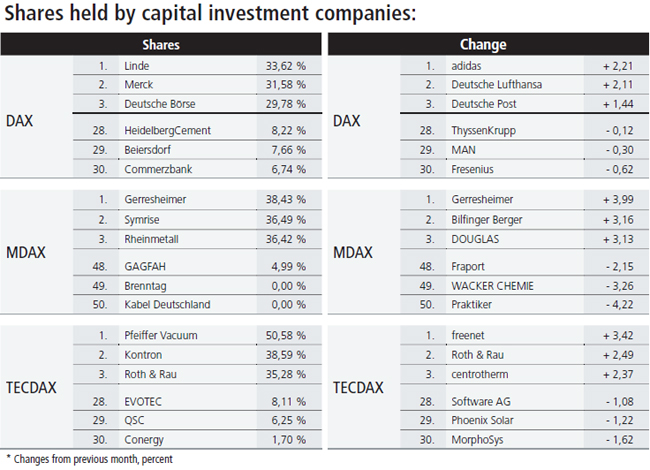
VIPsight Shareholder ID <click here>
Event Diary
13 October 2010 CFS Presidential Lectures: Paul Kirchhof „Bürgerliche Freiheit im Prozess der europäischen Integration und eines weltoffenen Marktes [Civil liberties in the process of European integration and an open world market]“
Organizer: Center for Financial Studies; place: Goethe-Universität, House of Finance, Frankfurt am Main; free; info: www.ifk-cfs.de/index.php?id=1070&L=1.
13 October 2010 Haarmann Frühstück Recht und Steuern „Jahressteuergesetz 2010 – Steuerliche Änderungen zum Jahreswechsel [Haarmann breakfast on law and tax: “Finance Act 2010 - Tax changes for the New Year”]“
Organizer: Haarmann; place: Restaurant Opèra, Alte Oper, Frankfurt am Main; free; info: 0049 69 92059-70
14 October 2010 Übernahmen, Squeeze-Out und Delisting: Aktuelle Herausforderungen [Takeovers, squeeze-outs and delisting: Current Challenges]
Organizer: DAI; place: DVFA-Center im Signaris, Mainzer Landstraße 37-39, François-Mitterrand-Platz 1, Frankfurt am Main; cost: €900; info: 069 929150
14 October 2010 Bilanzkontrolle 2011 durch DPR und BaFin: Recht und Praxis [Balance-sheet checks in 2011 by DPR and BaFin: Law and Practice]
Organizer: DAI; place: IHK, Börsenplatz 2-4, Frankfurt am Main; cost: €900; info: 069 929150
19 October 2010 IVOX 2010 Symposium „Introducing Shareholder Engagement Cooperation or Confrontation?”
Reading suggestions
Becker, Hans Paul, Investition und Finanzierung [Investment and Finance]
Gabler Verlag, 4th ed., 371 pp, €29.95, ISBN 978-3-8349-2468-1
This textbook defines the objectives of corporate investment and financial policies in companies, simply and comprehensibly explaining the principles and methods for calculating and financing investment. Traditional and new instruments are systematically presented, analysed and evaluated. Examples and problems with proposed solutions supplement the explanations. Newly included in the 4th edition are dynamic final-value methods and the consideration of earnings taxes in investment decisions. The exercise section has had additional problems and solutions added.
Greve, Gustav, Organizational Burnout
Gabler Verlag, 281 pp, €34.95, ISBN 978-3-8349-2291-5
If in a well-established organization recent successes falter, the cause is often a dangerous organizational burnout (OBO). For the first time, the author describes the widespread phenomenon of OBO, explains the failings of companies involved and shows a way out of the crisis. The author describes his experience of the typical causes, symptoms and consequences of organizational burnout, and an effective therapy.
Gruber, Walter, Martin, Marcus R.W., Wehn, Carsten S., Szenarioanalysen und Stresstests in der Bank- und Versicherungspraxis [Scenario analyses and stress tests in banking and insurance practice]
Schäffer-Poeschel Verlag, 388 pp, €99.95, ISBN 978-3-7910-2953-5
The authors present the whole range of topics on all relevant types of risk, the requirements of supervision, the impacts and implementation in bank management, compactly and from the user’s perspective. Value is placed on practice-oriented presentation, without giving up theoretical depth.
Keuper, Frank, Neumann, Fritz (eds.), Corporate Governance, Risk Management und Compliance
Gabler Verlag, 317 pp, €59.95, ISBN 978-3-8349-1558-0
The book contains an informative international comparison of corporate-governance rules and a critical examination of evaluation methods and IT risk management. Additionally, interactions between controlling and organization are thoroughly examined. Professor Keuper is Professor of Business Administration, in particular convergence and media management, at the School of Management and Innovation of the Steinbeis-Hochschule Berlin. Fritz Neumann is a partner at BearingPoint Management & Technology Consultants in Commercial Services.
Prexl, Sebastian, Bloss, Michael, Ernst, Dietmar, Haas, Christoph, Häcker, Joachim, Röck, Bernhard, Financial Modeling
Schäffer-Poeschel Verlag, 506 pages, including download offer, €59.95, ISBN 978-3-7910-2838-5
The authors provide students and practitioners with an application-oriented guide to the central topics in corporate finance, derivatives and portfolio management. The character as a course book and the practical examples enable rapid and interactive learning. Two workshops, on Microsoft Excel and the VBA programming language, complete the financial and economic expertise. The contents of this book are the basis for training as a Certified Financial Modeler (CFM).
Renz, Hartmut, Hense, Dirk, Wertpapier-Compliance in der Praxis [Securities compliance in practice]
Erich Schmidt Verlag, 1,138 pp, €99.95, ISBN 978-3-503-12449-7
A must for anyone aiming at more certainty in all areas of securities compliance. MiFID, WpHG, MaComp, the BaFin concretizing circulars etc. – more strictly regulated than ever before, credit and financial-services institutions are under public observation. Violations of the complex supervisory requirements involve significant legal and reputational risks. This work shows solutions in all subject areas of securities compliance. Experts – including ones from BaFin and leading financial institutions and law firms – provide comprehensive information, in particular on issues such as investment advice and recording it, financial analysis and portfolio management, marketing including the current BaFin circular on customer information, labour law and human resources as well as minimum requirements for compliance (MaComp). The individual areas are also reviewed, issues considered and quotable answers to legal questions included.
Söhnholz, Dirk, Rieken, Sascha, Kaiser, Dieter G., Asset Allocation, Risiko-Overlay und Manager-Selektion
Gabler Verlag, 222 pp, €49.95, ISBN 978-3-8349-2408-9
As the financial crisis has shown, an asset allocation based on the classical Markowitz model has weaknesses in practical use. The authors develop new approaches in the areas of quantitative asset allocation and alternative investments for sustainable investment success. They show that a strategic diversification of asset classes is still to be rated favourably. While the success of tactical asset allocation, especially in times of crisis, is questionable, the risk overlay concepts presented here have proven themselves. However, they have to date been applied almost solely to traditional asset classes. The authors demonstrate that these instruments are also important for non-traditional asset classes, examine the role of active and passive management and give an answer to the question of the correct number of asset managers. The result is a quasi-restriction-free “ideal portfolio” that can serve the investor as a model and be adapted to individual requirements.
Walter, Bernd Lorenz, Verantwortliche Unternehmensführung überzeugend kommunizieren[Convincingly Communicating Responsible Management]
Gabler Verlag, 204 pp, €39.95, ISBN 978-3-8349-2435-3
The tension between the pursuit of profit and morality is the central challenge of modern corporate and brand communications. This is especially true in the light of the efforts of companies to meet social claims by responsible management. Taking responsibility is one thing, communicating it convincingly the other. The secrets of successful communication from the past are condemned as “greenwashing” for lack of credibility. Essential to the success of communication is a coherent system of company values, supported in the first place by internal communication. The author provides a comprehensive overview of the communication of responsible management. The book is clearly structured, pointedly written and offers the reader many practical and scientifically sound ideas to implement.
Vahs, Dietmar, Weiand, Achim, Workbook Change Management
Schäffer-Poeschel Verlag, 406 pp, €49.95, ISBN 978-3-7910-2860-6
This workbook is a systematic and standardized presentation of the methods and instruments used in change management. The book is for anyone with the task of planning and implementing change initiatives in both profit and nonprofit undertakings.















